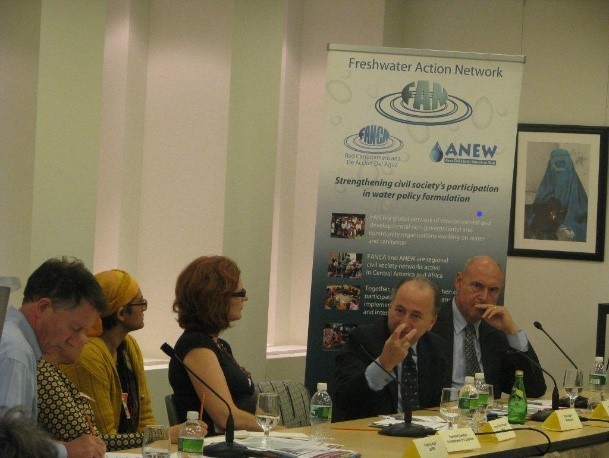Leveling the Playing Field on World Bank – Civil Society Dialogue
 Photo: Civil Society Team
Photo: Civil Society Team
After years of feeling that its policies were unfairly criticized by civil society organizations, the Bank is now ‘turning the tables’ by being formally asked to critique civil society ideas and papers. Likewise, after years offeeling ‘shut out’ and ignored by Bank experts, CSOs are confidently seeking Bank views on their
macro- economic research findings.
This trend is best exemplified by the launches of books written by well known CSO leaders at the Bank’s Infoshop over the past two years. These include the launch of “From Poverty to Poverty” by Duncan Green (Head of Research for Oxfam/GB) in November 2008, “Development Redefined” by John Cavanaugh (Director of the Institute for Policy Studies) and Robin Broad (Professor of International Development at American University) in February 2009; and “Unheard Truth” by Irene Khan (Secretary General of Amnesty International) in October 2009. In all three cases, Bank staff were asked to be discussants and offer their critiques of the books.
The most recent example of CSOs seeking Bank input on their research is Oxfam/GB who recently came to the Bank to share the preliminary findings of a study on the impacts of the global financial crisis on poor countries. The head of research for Oxfam/Australia, May Miller-Dawkins, made a presentation on February 18, 2010 to Bank and IMF staff on the initial findings of study carried out in 11 countries involving some 2,500 individuals and studies by a range of universities and international organizations. The study concluded that while the global financial crisis has hurt the poor around the world, its impact on developing countries has not been as severe as originally feared. Many countries, societies, communities and individuals have demonstrated an unexpected ‘resilience’, a finding that Oxfam, the World Bank and IMF agreed on, even if they did not necessarily agree on the reasons. The study attributes the high degree of resilience detected to strong social networks, economic structures, and state action. The study also noted the important mitigating role of conditional cash transfer and other government programs.
An economist from the Bank (Andrew Burns, Director of the Global Macroeconomic Trends Team of the Development Prospects Group) and one from the IMF (Andre Berg, Assistant Director for the Macro-economic Division / Research Department) were asked to comment on the research. Both commended Oxfam for seeking Bank input before the report is finalized, and noted that much of the Oxfam study findings mirrored the conclusions of similar Bank studies, particularly the focus on resilience and how volatility can affect the poor. Both also suggested however, that the Oxfam report could benefit from macro-economic and historical analysis that would explain why developing countries were able to cope better with this crisis than previous ones. Berg noted that IMF research found that much of the resilience demonstrated by developing countries is directly related to the financial reforms they undertook in the decade before the crisis. He cautioned, however, that the crisis is not over and that developing countries may build up large debts as they attempt to climb out of the crisis.
Oxfam Blog
Bank Web Piece
Photo: Civil Society Team
 Photo: Civil Society Team
Photo: Civil Society Team